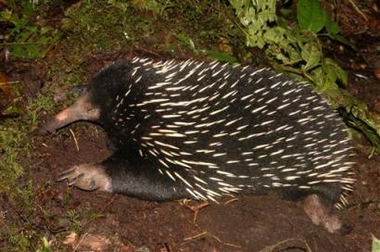Extinct egg-laying mammal rediscovered in jungles of New Guinea
‘Extinct’ egg-laying mammal rediscovered in jungles of New Guinea
mongabay.com
July 15, 2007
An egg-laying mammal thought extinct for nearly 50 years has been rediscovered in the Indonesian province of Papua on the island of New Guinea, reports BBC News.
The creature, called Attenborough’s long-beaked echidna (Zaglossus attenboroughi) after TV personality Sir David Attenborough, was only known to biologists through a specimen dating from 1961. The burrowing marsupial was rediscovered by a team of scientists on a month-long expedition in Cyclops Mountains Reserve organized by the Zoological Society of London.
“We hope that Sir David Attenborough will be delighted to hear that his namesake species is still surviving in the wilds of the Papaun jungle,” BBC News quoted Jonathan Baillie, ZSL’s Evolutionarily Distinct and Globally Endangered (Edge) program manager as saying.
 Long-beaked echidna (Zaglossus bruijni), a closely related species, from the Foja mountains in New Guinea. Photo by Stephen Richards of Conservation International. |
While nothing is known about the biology of Attenborough’s long-beaked echidna, other echidna in New Guinea and Australia are nocturnal and feed on earthworms in forest litter and soil. The echidna is one of five surviving types of monotremes (egg-laying mammals) — four other species of echidna and the platypus — that have inhabited Earth since around the time of the dinosaurs. Echidna are covered coarse hair and spines they use for defense.
The team plans to return next year to the Cyclops Mountains to photograph the species, according to BBC News.
The discovery was made near the Foja mountains where scientists discovered dozens of unknown species in 2006.